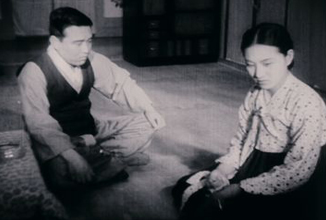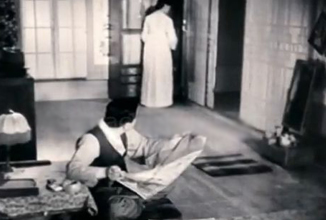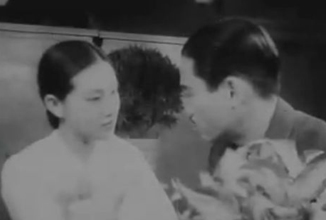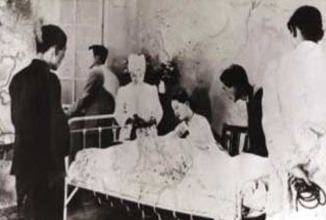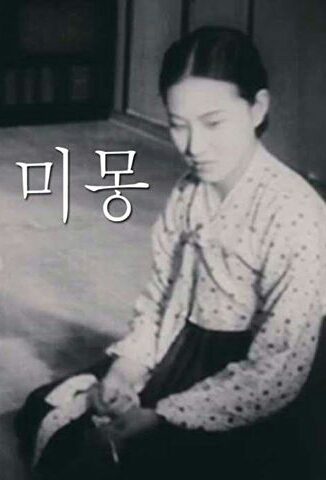
 |
||||||
Synopsis: Ae-sun is a wife and mother of an only child but the responsibilities and expectations placed upon her - by both her family and society at large - sit none too well against her personal needs as a woman; leaving her detached and sullen and aching for a means of escape from the familial ties that bind her. The opportunity to do just that presents itself on a visit to a department store and no sooner does a random man try to seduce her there than she, without hesitation, jumps at the chance to leave her family behind and be appreciated as a woman in her own right; the sexual being she has been forced to hide for so long finally coming to the fore and escaping its moral shackles.
Review: Any of you who are even vaguely familiar with my reviews and discussions of Korean Cinema will likely be aware of my continued interest in - some might say obsession with - the ways in which depictions of women in Korean films have gradually altered and progressed over the years; the concept of female characters regularly and repeatedly being used to enable dissections of Korean society at large, past and present; and the inherent underlining of the changing place of women within it. After the Japanese occupation of Korea finally came to an end in 1945 - a period lasting decades during which time the Japanese sought to utterly eradicate every aspect of Korean nationality and culture, even banning Korean language films in 1942 - Korea could at long last begin to re-establish its identity and, in the wake of the subsequent Korean War, South Korean Cinema during the Golden Age (late 50s and 60s) began to regularly focus narratives on the promotion of moral and sociological ideals. With outside nations and/or influences no longer being of immediate threat, it's understandable that Korean cinema turned its fears inward and centred an utter plethora of cinematic depictions of women around the dire - and by implication inevitable - consequences (in an individual, family and national sense combined) of wanton disregard for the moral 'right'; of the putting of one’s own needs above those of family and nation; and even of stepping outside the norm, and as such stories of seductresses, mental instability caused by sexual desire and family units torn apart by adulterous behaviour abounded.
However, what may come as somewhat more of a surprise is the fact that as far back in Korean cinema history as Sweet Dream (aka Death's Lullaby) in 1936, such cautionary tales were being detailed in Korean film and perhaps it is precisely because of Japan's attempts to erase 'Korean-ness' that the importance of adhering to moral ideals; upholding family values and responsibilities; and self-sacrificing for the greater good were so strongly underlined within them. From the very moment we are first introduced to Ae-sun - as she sorts her clothes hanging in the closet; paying next to no attention to her husband's lecture on a woman's responsibilities and completely ignoring her daughter - it is blatantly obvious not only that she feels no real emotional commitment to her family or their needs/expectations but also that she feels positively trapped it and them.In the early stages of Sweet Dream, there is a small scene in which the camera centres on a bird in a gilded cage shortly followed by Ae-sun and her husband being heard arguing. Though Ae-sun exclaiming "Then you might as well lock me up! I'm not a bird in a cage!" as a vocal accompaniment to the previous visual imagery could never be described as subtle it nonetheless serves its purpose incredibly well. In fact, the success of this small scene in spite and its obvious nature really sums up the remainder of Sweet Dream's narrative and the depiction of its themes, almost to a tee: As we follow the downward spiral of Ae-sun's life, she is repeatedly shown visually in various city settings - department store; bar/club; speeding along the highway etc - the inference clearly being that Ae-sun turning her back on traditional values and willingly embracing the modern world has helped to create the self-serving woman she has become; her downfall being the inevitable and only possible outcome of a woman stepping beyond her 'right and proper' place in society.. However, Sweet Dream never allows or risks showing Ae-sun as simply a victim of circumstance or wholly just the product of modernisation; resolutely stating throughout that she knows exactly what she's doing, and ultimately what she's done.
While Sweet Dream may seem fairly predictable thematically, it should be remembered that we're dealing here with a 1936 timeline - with the numerous Korean films that have made similar statements over the years all being subsequent to Sweet Dream, by a large margin - and any familiarity is frankly in hindsight of films that didn't even exist at the time. Cast:
Moon Yae-bong, Cho Taek-won, Yoo Sun-ok, Kim In-kyu Side-note: For a time, 'Sweet Dream' was considered to be the oldest surviving Korean film until the discovery in 2007, by the Korean FilmArchive, of silent film 'Crossroads of Youth' (1934). However, at the time of writing this review 'Sweet Dream' is still the oldest suriving Korean film with sound.
|
||||||
All images © Kyeong Sung Studio, Korean Film Archive Review © Paul Quinn |
||||||

